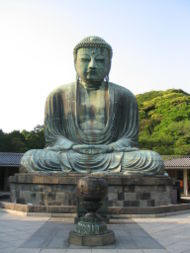
Finally to answer the question, does Mahayana Buddhism answer the ultimate question, is truth subjective? Mahayana also depicts that reality is explained in the doctrine of the two truths. This doctrine explores that existence can be understood as both ultimate and conventional. Conventional truth is how we usually see the world, a place full of diverse and distinctive things and beings. However the ultimate truth, which is what is being explored by Mahayana Buddhism, is that there are no distinctive things or beings in the universe. B y saying this, it is not to say that nothing exists. It is saying that there are no distinctions.
The unity of all things and beings is unestablished. (Buddhism, 2011) Nagarjuna, who is considered to be the fathers of Mahayana Buddhism, taught that there is neither reality nor non-reality. It was introduced that all elements of Dharma are impermanent and have no independent existence in themselves, much like Kierkegaard believes. All of life is reduce to a single, underlying flux, a stream of existence with an everlasting becoming (Kleine, 2004). In Nargarjuna’s teaching of relative and the ultimate truth, believes relative truth is conventional truth, experienced by the senses, whereas, the ultimate truth can only be ‘realized’ by transcending concepts through intuitive faith and beliefs.
The unity of all things and beings is unestablished. (Buddhism, 2011) Nagarjuna, who is considered to be the fathers of Mahayana Buddhism, taught that there is neither reality nor non-reality. It was introduced that all elements of Dharma are impermanent and have no independent existence in themselves, much like Kierkegaard believes. All of life is reduce to a single, underlying flux, a stream of existence with an everlasting becoming (Kleine, 2004). In Nargarjuna’s teaching of relative and the ultimate truth, believes relative truth is conventional truth, experienced by the senses, whereas, the ultimate truth can only be ‘realized’ by transcending concepts through intuitive faith and beliefs.

